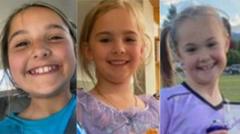Han Tae-soon, having searched for 44 years, found her daughter Kyung-ha, now known as Laurie Bender in the US. Following their reunion, Han is suing the South Korean government for facilitating illegal adoptions in a controversial program that has affected thousands of families. The case signifies a broader movement seeking justice for victims of past adoption abuses.
A Mother’s 44-Year Quest: Legal Action Against South Korea Over Child Adoption Scandal

A Mother’s 44-Year Quest: Legal Action Against South Korea Over Child Adoption Scandal
After decades of searching, Han Tae-soon reunites with her daughter, Kyung-ha, only to turn towards the courts, suing the South Korean government for its role in illegal adoptions.
For four decades, Han Tae-soon searched fruitlessly for her daughter, Kyung-ha, whom she last saw as a child in 1975. Their reunion came in dramatic fashion in 2019, revealing Kyung-ha's transformation into Laurie Bender, a nurse living in California. Allegedly kidnapped at age six and placed into a faulty adoption system, Han is now holding the South Korean government accountable through a lawsuit, highlighting long-standing issues of fraud and human trafficking in the country's overseas adoption program.
South Korea has a controversial adoption history, with between 170,000 to 200,000 children sent abroad since the program's inception in the 1950s. A recent inquiry has uncovered severe human rights violations by governments over the years, allowing private agencies immense power over child placements, which fueled allegations of illegal adoptions, mismanagement, and exploitation.
Han’s lawsuit, which is set for trial soon, marks a significant step in confronting these systemic grievances. As the first biological parent of an adoptee to seek governmental damages, her action could pave the way for others affected by these distressing affairs. The government expressed sympathetic regret while consideration of procedural changes remains ongoing, including providing greater oversight over child placements.
The emotional ordeal of both mother and daughter cannot be overstated. Over the years, missteps, false identities, and lost records have hindered many adoptees and biological parents from discovering their truths. Advocates for adoptee rights stress that accountability for past abuses is vital for healing and justice.
Though changes to South Korea's adoption laws have been initiated — such as stricter regulations on adoption practices — the shadows of history loom large for families like Han's. The emotional scars linger, compounded by barriers to communication, as they grapple with the aftermath of their experiences in the years since.
While Han diligently practices English to strengthen ties with Kyung-ha, confronting a past filled with pain, anxiety, and loss remains an uphill battle, as no compensation could ever reconcile these shattered lives.





















